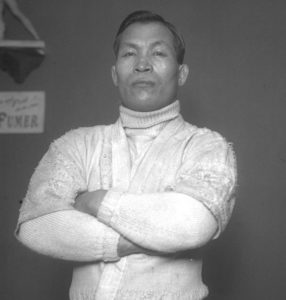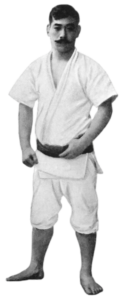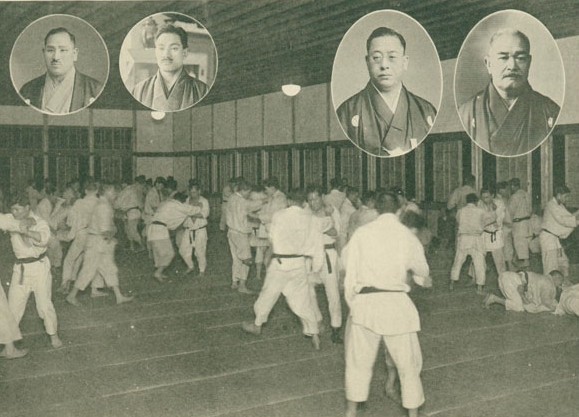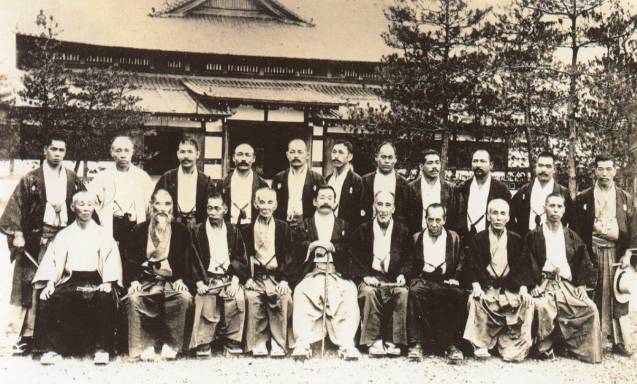
How I Became a Ju-Jitsu Champion
如何にして予は柔術王者となりしか
by Taro Miyake
三宅太郎
Sydney Sun Times – March 9, 1905
How would you like to get up at four o’clock on a bitterly cold January morning, and wrestle for two or three hours with no covering but a thin, loose tunic and knee breeches, when the wrestling mats are frozen hard, and the garments you wear are quite stiff with frost? (asked Tarro Myaki of a London journalist).
どれ程あなたは望もうか、酷寒の一月の朝四時に起床して、薄く、緩い上着と半ズボンだけを着てニ、三時間レスリングする事を、レスリング・マットが硬く凍り、あなたの着る衣服が霜ですっかりこわばる時に?(尋ねたのは三宅太郎があるロンドンの記者に。)
Yet that is what we ju-jitsu wrestlers do in Japan — at least, those of us who are very keen, and are anxious to harden our bodies and to practise endurance. Very often after such a morning I have been so sore and chafed that the clothes I wore made me smart all over. But I have turned out again next morning, all the same, until my skin got hard enough to withstand the cuts and scrapes of the hard mats.
しかしそれは我々柔術家が日本でしていることである…少なくとも、我々の内で己の体を鍛練する事と忍耐を修練する事にとても熱心で、それを望む者達は。斯様な朝の後にしょっちゅうわたしは余りに擦りむいて痛いのでわたしの着た服がわたしを至る所ひりひり痛ませる程であった。しかしわたしは翌朝再び支度していた、全く同様に、わたしの肌が硬いマットの為の切り傷や引っかき傷によく耐えるに十分なだけ硬くなるまで。
Although, like all Japanese boys, I was in a way familiar with ju-jitsu — for is it not as much a part of our national schooling as your football, cricket, and other games? — yet it was not till I was eighteen years old that I took it up in so keen and determined a spirit as to lead me eventually to become the champion of my country. This was principally because I had other things to do, and did not have the time to devote to my favorite sport till I reached that age.
しかしながら、全ての日本の少年達の如く、わたしは幾分柔術になじんでいた…なぜならばそれはあなた方の蹴球、クリケット、並びに他の競技と同じ程に我等が国民の学校教育の一部であるから?…しかしわたしは十八歳になってやっとわたしをついには我が国の王者となるべく導く程に激しくて断固たる精神に於いてそれを始めたのであった。これは主としてわたしがその年齢に達するまで為すべき他のものを持っていて、我がお気に入りの運動競技に専念すべき時間がなかった為であった。
When I did begin, however, I made up for lost time. I entered upon my apprenticeship, so to speak, to the art of self defence with the fixed determination to reach the top of the tree, and with this end in view I concentrated all my attention upon learning the tricks of throw and lock which were shown me, and making myself more proficient at them than those who taught me. That I was successful in my endeavors you may guess, when I tell you that at the end of a year and a half I went in for and won my first contest.
わたしが始めた時、しかしながら、わたしは失った時間の埋め合わせをした。わたしは、言わば、その護身術に最高位に達するべく固い決意と共に、そしてこの目的を目論んで、弟子入りした。わたしが己の全ての注意を注いだのはわたしに示された所の投げ技と固め技を習得する事、そして自身をしてわたしに教えた人達よりもそれ等により熟達せしめる事であった。わたしが我が努力の内に成功した事をあなたは推測してよい、一年半の終わりにわたしが我が最初の競技に参加して勝利した事をわたしがあなたに語る時に。
This first success set the final spark to my enthusiasm, and two or three subsequent defeats in minor matches, such as every beginner must suffer, fanned it into a flame. My improvement during the nine months which followed was so rapid that about that time I obtained my first position as instructor.
この最初の成功が我が熱中に決定的な活気を付与し、そしてどの初心者も被らねばならない様な、重要ならざる試合に於けるニ、三のその後の敗北が、それを煽り立てて炎に変えた。続く九ヶ月間の我が上達が余りに速かった為その時分にわたしは教師として我が最初の職を得た程であった。
Until I was twenty-one, and apart from my duties as instructor, I studied ju-jitsu under one of our most famous teachers, Tanabe, and, although I was still very young, he entrusted me with all the secrets of his school, for in Japan, there are distinctive “schools” of ju-jitsu, just as you have distinctive ‘schools’ of art. Each school has some special little tricks and secrets of its own, which are only fully disclosed to its pupils when they reach a certain proficiency, or years of discretion.
わたしが二十一になって、教師としての我が職務から離れるまで、わたしは柔術を我等が最も高名なる先生の一人、田辺の下で学び、そして、わたしはまだとても若かったけれども、彼がわたしに彼の流派の全ての極意を委ねたのは、ちょうどあなた方が特色のある芸術の「諸流派」を持つ様に、日本に於いては特色のある柔術の「諸流派」がある為であった。各流派はそれ自身の特別な僅かな秘訣と極意を持っており、それ等はその門人達が一定の熟達、或いは任意の年限に達する時に彼等に完全に明かされるのみである。
When I was twenty-one, I was appointed instructor to the police at Kioto, and during the time I was there I still went on learning, studying at that time in the great Uyemura School. Here, again, I proved my self so proficient that I learnt their secrets before I moved on to Osaka to teach the police there. At Osaka I worked under another great teacher, Handa, and in this way I mastered the secrets of three distinct schools of ju-jitsu.
わたしが二十一であった時、わたしは京都警察の教師に任ぜられ、そしてわたしがそこにいた期間ずっとわたしは当時偉大なるうえむら流でなお習い、学び続けた。ここで、再び、わたしは大阪へと立ち去る前にわたしが彼等の極意を習得する程に自身が熟達した事を示した。大阪でわたしはもう一人の大先生、半田の下で修行し、そしてこの様にしてわたしは三つの異なる柔術の流派の極意を会得したのであった。
During, and subsequent to this time I went in for numerous contests, and I am probably more proud at being able to tell you that I have never been beaten in any important match than your English gentlemen are of winning the Derby.
この期間とその後にわたしは数多くの競技に参加し、そしてわたしが如何なる重要な試合にも決して負かされなかったとあなたに言い得る事をわたしは恐らくあなた方の英国紳士達がダービー競馬の勝利に思うより以上に誇りに思う。
It was in Osaka, last May, that I went through the most trying contests I have ever taken part in, and achieved the greatest success of my career by beating all who opposed me. For this an unusual honor was paid me in the shape of a gold medal, which was presented to me by the Crown Prince of Japan. I have also received a sword of honor from Prince Komatsu, the President of the Butokukai — our national society for the encouragement of ju-jitsu, fencing, and other sports.
大阪にいた、最後の五月、わたしはかつて参加した内で最も困難な競技を経験し、そしてわたしに対抗する全員に勝る事によって我が経歴中最大の成功を遂げた。 この為に尋常ならざる敬意がわたしに払われたのは、日本の皇太子によってわたしに贈られた所の、金メダルという形に於いてであった。わたしはまた小松宮親王、武徳会の総裁からの名誉の刀を受け取った…武徳会は柔術、剣術や他の武術を奨励する為の国民協会である。
What I am specially proud of, however, is that at the age of twenty-two I was admitted to the fifth degree in ju-jitsu. This is rarely attained before the age of thirty five, and then is conferred more as an honorable recognition of a closing career than as the reward of real proficiency.
わたしが特に誇りに思う事は、しかしながら、二十二歳で柔術の五段を許された事である。これは三十五歳前には滅多に達せられず、かつその上真の熟達の報いとしてよりもむしろ終えられる経歴の名誉の表彰として授与される。
Now I suppose you will want to know something about my training. Well, that is soon told. My only training has been hard work. We Japanese athletes pay no attention to diet, but just eat and drink and smoke like everyone else. But those of us who are specially keen go through trials of endurance which the others will not face.
今わたしが推測するのはあなたが我が訓練について何がしかを知りたいであろう事である。よかろう、それは直ぐ話される。我が唯一の訓練は刻苦勉励であった。我々日本人運動家達は食事に注意を払わないが、ただ他の皆の様に食べかつ飲みかつ喫煙するのみである。しかし我々の内で特に熱心な人々は他者が立ち向かわぬであろう所の忍耐の試練を経験する。
What sort of condition I am in you may judge from the fact that from ten o’clock in the morning, when I commence giving lessons in the Japanese school of Ju-jitsu, which Yukio Tani and I have founded in London at 305 Oxford-street, till eleven o’clock in the evening, when I finish my last bout on the stage, I am practically wrestling all day!
如何なる類の状態にわたしがあるかあなたが判断し得るのは朝の十時、谷幸雄とわたしがロンドンはオックスフォード街305番地に設立した所の、柔術日本学校に於いてわたしが授業をし始める時から、晩の十一時、わたしが舞台で我が最後の勝負を終える時まで、わたしが終日実地にレスリングをしている事実からである!
All my efforts now are centred upon trying to make ju-jitsu champions out of other people, but, although you Englishmen are eminently suited to become experts, it is difficult to get you to take it seriously. You take it up as an amusement and an exercise, but you do not persevere and stick to it till you become expert. Englishwomen, I think, are far quicker to learn it than the men. I have more than one lady pupil who is very expert, indeed, and I should be sorry for anyone who attacked them now.
あらゆるわたしの努力は今や他の人々から柔術王者を輩出する為の試みに集中されているものの、あなた方英国人達は著しく達人となるにふさわしいけれども、あなた方をして本気にそれを行なわしめるのは難しいのである。あなた方はそれを娯楽かつ運動として取り組むが、あなたはあなたが達人になるまでそれをやり通しかつそれに固執する事はない。英国婦人方は、わたしが思うに、男達よりもそれを習得するのがはるかに速い。わたしが持つのは、実の所、極めて、熟達した淑女の弟子が一人どころではなく、そしてわたしは今や彼女達を攻撃した如何なる者に対しても気の毒に思うべきであろう。
I find hard work agrees with me, and I have an excellent appetite. I conform to your ways now that I am in England — which is a country I like very much indeed — by eating English food at English times. That is to say, I have breakfast, lunch, tea, and dinner, all of them at regular times except the last, which is what you call a ‘movable’ feast’ with me. I have it whenever I am hungry.
わたしは刻苦勉励がわたしの性に合うと知っており、そしてわたしは素晴らしい食欲を持っている。わたしは今やあなた方の流儀に従う、わたしが英国…実の所わたしが大いに好きな国である…にあって英国の時間に英国の食べ物を食べる事によって。即ち、わたしが取るのは朝食、昼食、午後のお茶、そして晩餐、それ等の全てを、あなた方がわたしと共に「動かせる」宴会と呼ぶ所の、最後のものを除いて定時に。わたしは空腹の時は何時でもそれを食べる。
There is one thing which everyone over here seems very much surprised at. I have never had a cold bath in my life. We don’t go in for cold baths in Japan. If we bathe in the open air it is in the Summer time, when the sea or the river is quite warm. I have several warm baths a day — whenever I have finished practice. If I took a cold bath I should catch cold at once, and
get out of trim.
こちらで誰をもはなはだ驚かせるらしい一つの事がある。わたしは生涯の内で一度も冷水浴をした事がない。我々は日本で冷水浴に参加しない。もしも我々が野外で水浴びをするならばそれは夏季に於いて、海ないし川がすっかり温かい時である。わたしは一日に何度か温かい風呂に入る…練習を終えた時は何時でも。もしわたしが冷水浴をしたならばわたしは直ちに風邪を引いて、体調を崩すはずである。




